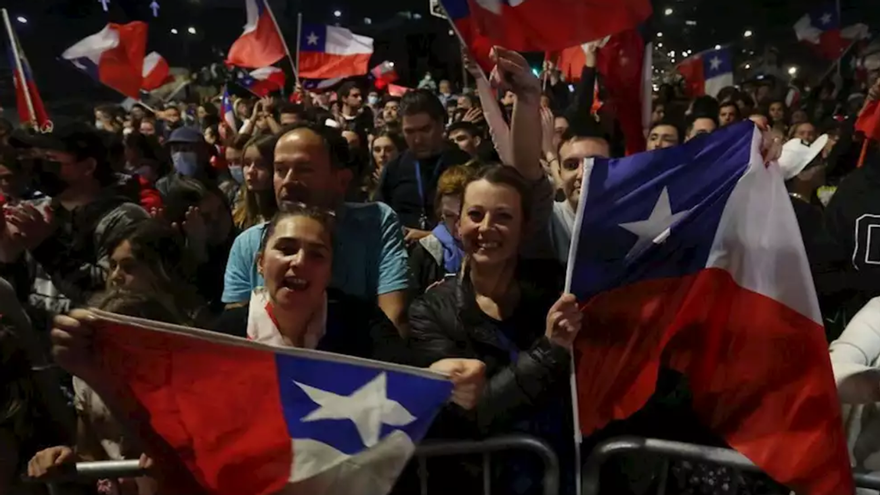
![]() 14ymedio, Juan Izquierdo, Havana, 5 September 2022 — The rejection by Chileans of the draft Constitution endorsed by President Gabriel Boric hasn’t taken the Cuban pro-government media by surprise, but it still provokes resentment and bitterness.
14ymedio, Juan Izquierdo, Havana, 5 September 2022 — The rejection by Chileans of the draft Constitution endorsed by President Gabriel Boric hasn’t taken the Cuban pro-government media by surprise, but it still provokes resentment and bitterness.
This Sunday, the proposal was defeated, with almost 62% of the votes, and Chile chose to maintain the current text, written in 1980, and reformed after the fall of Pinochet and the establishment of democracy.
Meanwhile, in Cuba, several reports, articles and opinion pieces, programmed from the offices of the Central Committee of the Communist Party, spared no reproach or nefarious adjective against those who revalidated the “Constitution of the dictatorship.”
An analysis by journalist Oliver Zamora, broadcast on Noticiero Nacional de Televisión, described the approval of the project as “the most important political event in Chile” since the end of the government of Augusto Pinochet. Enthusiastic about the continental turn to the left, no matter if it’s grotesque or outdated, the reporter doesn’t hide his dismay at defeat.
Chileans were supposed to vote to “delete the legacies of the dictatorship,” and achieve the “real, not apparent, change” that only socialism can offer. Zamora points out that Chile rejected the possibility of a “stronger state,” which would guarantee rights and not allow itself to be “conquered” by neoliberalism.
They threw away, in the opinion of the journalist, a “superior” Constitution because of the media campaign of their enemies, which is a sign that Chile is a “polarized society, trapped in the past.”
Once the result was known, another of the voices of officialdom, the journalist Talía González, insulted the text of the current Constitution, “written during the military dictatorship.” “The Chileans,” she lamented, “denied their support for a text written by leftist and progressive forces,” to which President Boric had given his “total support.”
Both the State newspaper Granma and Cubadebate took advantage of euphemisms so as not to admit the defeat of the preliminary draft. Metaphors, circumlocutions and extensive paragraphs were intended to cover up the “Rejection option.”
“The option of maintaining a Constitution inherited from the time of Augusto Pinochet is announced as the winner,” admitted the national organ of the Communist Party. “Several experts agree that this result is the consequence of a wide campaign of disinformation regarding the new Constitution; and of an incentive, with a lot of money, to reject the text or deliver invalid votes,” it simplified.
“The most likely thing,” the editors said with disdain, is that Chileans will “wake up without the possibility of having a Constitution” with guarantees in health, education, the environment and pensions.
For Juventud Rebelde, the opportunity was missed to crystallize “the popular claims of the decades under the laws left by the dictator Augusto Pinochet.” Its previous articles warned, with alarm, that all polls pointed to the “possibility of the triumph of Rejection.”
But the “newspaper of Cuban youth” reassured its readers: “There are totally different forecasts and mathematical prediction studies” based on readings from social networks, which “have predicted that the triumph will be of Approval.”
However, there is something that all the official Cuban media agree on. Despite not understanding the mechanisms inherent in democracy and that it seems inconceivable that the government of a country doesn’t have absolute authority over the approval of the laws it intends to propose, as happens on the Island, each comment about Chile ends up predicting Boric’s triumph by any means.
It doesn’t matter if it is the direct one, which has just failed; or the more subtle and slow one, calling a plebiscite again. “Boric needs it,” say the Cuban newspapers, in order to consolidate the socialist reform in a complex country like Chile, which will not easily give up freedom to choose its future.
Translated by Regina Anavy
____________
COLLABORATE WITH OUR WORK: The 14ymedio team is committed to practicing serious journalism that reflects Cuba’s reality in all its depth. Thank you for joining us on this long journey. We invite you to continue supporting us by becoming a member of 14ymedio now. Together we can continue transforming journalism in Cuba.
